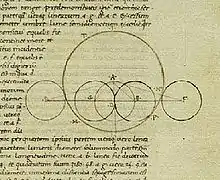Portal:History of science
The History of Science Portal
The history of science covers the development of science from ancient times to the present. It encompasses all three major branches of science: natural, social, and formal.
Science's earliest roots can be traced to Ancient Egypt and Mesopotamia around 3000 to 1200 BCE. These civilizations' contributions to mathematics, astronomy, and medicine influenced later Greek natural philosophy of classical antiquity, wherein formal attempts were made to provide explanations of events in the physical world based on natural causes. After the fall of the Western Roman Empire, knowledge of Greek conceptions of the world deteriorated in Latin-speaking Western Europe during the early centuries (400 to 1000 CE) of the Middle Ages, but continued to thrive in the Greek-speaking Eastern Roman (or Byzantine) Empire. Aided by translations of Greek texts, the Hellenistic worldview was preserved and absorbed into the Arabic-speaking Muslim world during the Islamic Golden Age. The recovery and assimilation of Greek works and Islamic inquiries into Western Europe from the 10th to 13th century revived the learning of natural philosophy in the West.
Natural philosophy was transformed during the Scientific Revolution in 16th- to 17th-century Europe, as new ideas and discoveries departed from previous Greek conceptions and traditions. The New Science that emerged was more mechanistic in its worldview, more integrated with mathematics, and more reliable and open as its knowledge was based on a newly defined scientific method. More "revolutions" in subsequent centuries soon followed. The chemical revolution of the 18th century, for instance, introduced new quantitative methods and measurements for chemistry. In the 19th century, new perspectives regarding the conservation of energy, age of Earth, and evolution came into focus. And in the 20th century, new discoveries in genetics and physics laid the foundations for new subdisciplines such as molecular biology and particle physics. Moreover, industrial and military concerns as well as the increasing complexity of new research endeavors ushered in the era of "big science," particularly after the Second World War. (Full article...)
Selected article -
The presence of women in science spans the earliest times of the history of science wherein they have made significant contributions. Historians with an interest in gender and science have researched the scientific endeavors and accomplishments of women, the barriers they have faced, and the strategies implemented to have their work peer-reviewed and accepted in major scientific journals and other publications. The historical, critical, and sociological study of these issues has become an academic discipline in its own right.
The involvement of women in medicine occurred in several early western civilizations, and the study of natural philosophy in ancient Greece was open to women. Women contributed to the proto-science of alchemy in the first or second centuries C.E. During the Middle Ages, religious convents were an important place of education for women, and some of these communities provided opportunities for women to contribute to scholarly research. The 11th century saw the emergence of the first universities; women were, for the most part, excluded from university education. Outside academia, botany was the science that benefitted most from contributions of women in early modern times. The attitude toward educating women in medical fields appears to have been more liberal in Italy than in other places. The first known woman to earn a university chair in a scientific field of studies was eighteenth-century Italian scientist Laura Bassi. (Full article...)Selected image

Charles Darwin has been caricatured as a monkey innumerable times since the publications of Origin of Species and Descent of Man.
Did you know
... that the Merton Thesis—an argument connecting Protestant pietism with the rise of experimental science—dates back to Robert K. Merton's 1938 doctoral dissertation, which launched the historical sociology of science?
...that a number of scientific disciplines, such as computer science and seismology, emerged because of military funding?
...that the principle of conservation of energy was formulated independently by at least 12 individuals between 1830 and 1850?
Selected Biography -
 Priestley by Ellen Sharples (1794) |
Joseph Priestley FRS (/ˈpriːstli/; 24 March 1733 – 6 February 1804) was an English chemist, natural philosopher, separatist theologian, grammarian, multi-subject educator, and liberal political theorist. He published over 150 works, and conducted experiments in electricity and other areas of science. He was a close friend of, and worked in close association with Benjamin Franklin involving electricity experiments.
Priestley is credited with his independent discovery of oxygen by the thermal decomposition of mercuric oxide, having isolated it in 1774. During his lifetime, Priestley's considerable scientific reputation rested on his invention of carbonated water, his writings on electricity, and his discovery of several "airs" (gases), the most famous being what Priestley dubbed "dephlogisticated air" (oxygen). Priestley's determination to defend phlogiston theory and to reject what would become the chemical revolution eventually left him isolated within the scientific community. (Full article...)Selected anniversaries
- 1749 - Birth of Edward Jenner, English physician and developer of the smallpox vaccine (d. 1823)
- 1758 - Birth of John St Aubyn, British fossil collector (d. 1839)
- 1765 - Death of Alexis Claude Clairault, French mathematician (b. 1713)
- 1897 - Birth of Odd Hassel, Norwegian chemist and Nobel Prize laureate (d. 1981)
- 1902 - Archaeologist Spyridon Stais finds the Antikythera mechanism.
- 1916 - Death of Boris Borisovich Galitzine, Russian physicist (b. 1862)
- 1943 - The United States Army contracts with the University of Pennsylvania's Moore School to develop the ENIAC.
- 1969 - The Soviet spaceprobe Venera 6 begins its descent into the atmosphere of Venus, sending back atmospheric data before being crushed by pressure.
- 2004 - The Stockholm Convention, an international treaty limiting the use of DDT and other persistent organic pollutants, goes into effect.
Related portals
Topics
General images
Subcategories
Things you can do
Help out by participating in the History of Science Wikiproject (which also coordinates the histories of medicine, technology and philosophy of science) or join the discussion.
Associated Wikimedia
The following Wikimedia Foundation sister projects provide more on this subject:
-
 Commons
Commons
Free media repository -
 Wikibooks
Wikibooks
Free textbooks and manuals -
 Wikidata
Wikidata
Free knowledge base -
 Wikinews
Wikinews
Free-content news -
 Wikiquote
Wikiquote
Collection of quotations -
 Wikisource
Wikisource
Free-content library -
 Wikiversity
Wikiversity
Free learning tools -
 Wiktionary
Wiktionary
Dictionary and thesaurus
-
 List of all portalsList of all portals
List of all portalsList of all portals -
 The arts portal
The arts portal -
 Biography portal
Biography portal -
 Current events portal
Current events portal -
 Geography portal
Geography portal -
 History portal
History portal -
 Mathematics portal
Mathematics portal -
 Science portal
Science portal -
 Society portal
Society portal -
 Technology portal
Technology portal -
 Random portalRandom portal
Random portalRandom portal -
 WikiProject PortalsWikiProject Portals
WikiProject PortalsWikiProject Portals


















_Venenbild.jpg.webp)





.jpg.webp)




















.jpg.webp)


